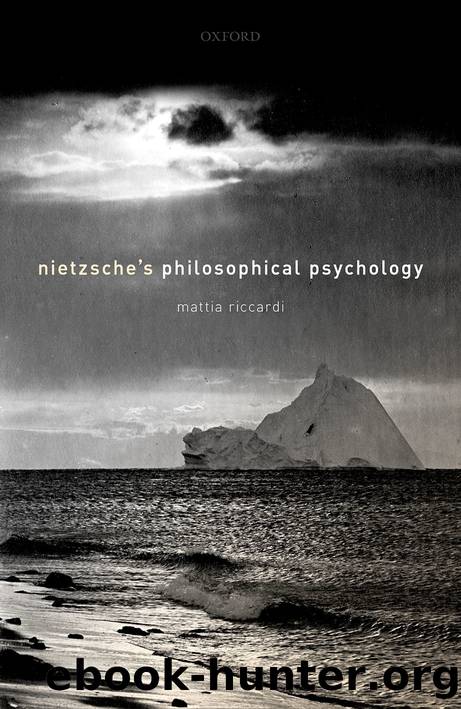Nietzsche's Philosophical Psychology by Riccardi Mattia;

Author:Riccardi, Mattia; [Riccardi, Mattia]
Language: eng
Format: epub
Publisher: Oxford University Press USA - OSO
Published: 2021-05-19T00:00:00+00:00
7
Nietzscheâs Epiphenomenalism about RConsciousness
One of the features Nietzsche ascribes to Rconsciousness in GS 354 is its âsuperfluousnessâ. Thisâtogether with things he says elsewhereâhave led some scholars to argue that he defends (a version of) epiphenomenalism. As Brian Leiter puts it, according to Nietzsche âconsciousness is not causally efficacious in its own rightâ (Leiter 2019:73; see, similarly, his earlier 2002:92; see also Welshon 2014, ch. 5.3). That Nietzsche is best read as an epiphenomenalist about Rconsciousness is also what I shall argue in this chapter.
As there are different ways of understanding what epiphenomenalism amounts to, I shall start by introducing some conceptual distinctions (Section 7.1). This will allow me to specify exactly which epiphenomenalist claim I take Nietzsche to be defending. More precisely, I shall argue that Nietzschean epiphenomenalism consists in the view that Rconscious states are not among the causally efficacious antecedents of token actions. Importantly, this view does not entail that such states do not play any causal role at all in our mental economy. It only denies that they play that specific causal role. In Section 7.2 I present what I take to be decisive textual evidence that the mature Nietzsche does in fact endorse the epiphenomenalist claim formulated above. Commenting on the relevant passages will also help to spell out some further aspects of his epiphenomenalist picture. I also consider how plausible that picture is in light of contemporary empirically informed debates concerning the role of conscious states in our mental life.
In previous work (Riccardi 2018; see also Leiter 2015 and 2019), I argued that Nietzscheâs HOT view of Rconsciousness provides a straightforward model for the kind of epiphenomenalism I ascribe to him. In Section 7.3 I review and finally reject my previous claim, for it failed to consider an important difference between standard HOT theories and Nietzscheâs hybrid one. In Section 7.4 I illustrate how Nietzschean epiphenomenalism about Rconsciousness works given his hybrid version of the HOT approach.
As pointed out above, the epiphenomenalist claim I want to ascribe to Nietzsche does not entail that Rconsciousness does not play any causal role at all in our mental life. In Section 7.5 I argue that its function is facilitating social coordination. More precisely, Rconscious states play a crucial role in the acquisition of social norms. That role, however, is not sufficient for the relevant norm to become behaviourally efficacious and, thus, cause our actions. For only internalizedâin a sense still to be specifiedânorms are behaviourally efficacious in that sense. In turn, though Rconscious states are often the channel through which we are presented with social norms, it depends on the arrangement of our drives and affects whether we internalize them or not.
Once all the ingredients of my account are in place, I go on to consider a range of objections usually levelled against epiphenomenalist readings of Nietzsche in Section 7.6. There, I argue that such objections failâat least when directed at the specific epiphenomenalist picture worked out in the previous sections.
Download
This site does not store any files on its server. We only index and link to content provided by other sites. Please contact the content providers to delete copyright contents if any and email us, we'll remove relevant links or contents immediately.
Walter Benjamin and the Actuality of Critique by Carlo Salzani(359)
Delphi Collected Works of Karl Marx (Illustrated) by Karl Marx(354)
Mortal Subjects by Christina Howells(310)
Philosophy of Mind: 50 Puzzles, Paradoxes, and Thought Experiments by Torin Alter & Robert J. Howell & Amy Kind(298)
Bushido: The Soul of Japan by Inazo Nitobe(282)
Wisdom For A King by Kapil Gupta(262)
Albert Camus by Foley John(224)
Nietzsche's Philosophical Psychology by Riccardi Mattia;(218)
The SPCK Introduction to Simone Weil by Stephen Plant(214)
The Wall Speaks by Jerr rreJ(212)
The Little Book of Stoic Quotes: Philosophy for a Meaningful and Courageous Life by Phil Van Treuren(211)
Jean-Paul Sartre by Churchill Steven; Reynolds Dr. Jack;(206)
Notes of an Underground Humanist by Chris Wright(191)
The Philosophy of Hope; Beatitude in Spinoza by Alexander Douglas(180)
Jacques Ranciere by Deranty Jean-Philippe;(178)
Love Your Life by Dominque Bertolucci(177)
The Stoic Creed (Stoicism Book 24) by William Leslie Davidson(159)
Seeing Through Christianity: A Critique of Beliefs and Evidence by Bill Zuersher(149)
Complete Works of Aeschines by Aeschines(141)
